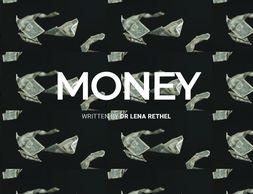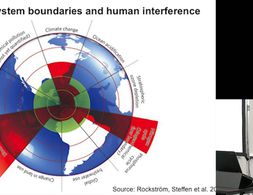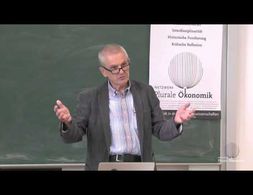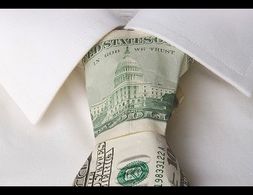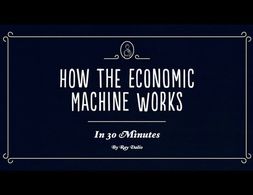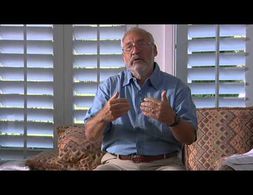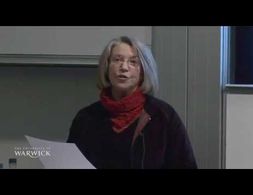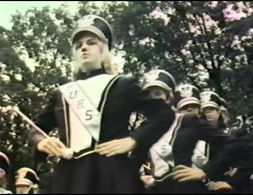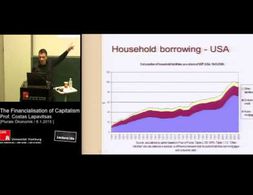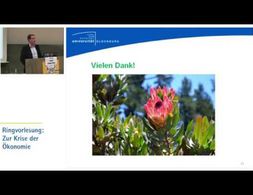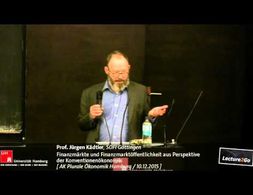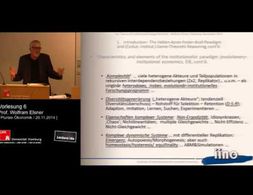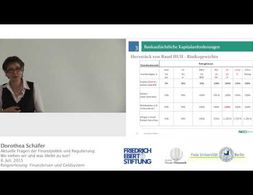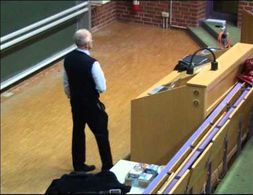1519 Ergebnisse
Welches Menschenbild für die ökonomische Bildung?
Nicht-egoistisches Verhalten und soziale Vergleiche in der Haushaltstheorie
This dossier gives an overview of the functions and the nature of money. The concept of Islamic finance is briefly explored, too.
In the keynote speech, Sigrid Stagl argues why it is necessary to include socio-ecological aspects in macoreconomic models. The talk focuses on the ecological necessities, mentioning limits to growth, resource extraction and planetary boundaries. At the end, Stagl shortly presents several current macroeconomic initiatives and models that move towards a a socio-ecological macroeconomics.
Walter Ötsch stellt die Ergebnisse einer Netzwerkanalyse eines Datensatzes zu Deutschen ordoliberalen Ökonomen in der Nachkriegszeit vor. Um die Daten zu interpretieren, verwendet er die Netzwerktheorie von Bruno Latour und kontextualisiert die Verbindungen der Personen im Netzwerk mit historischen Daten. Die Interpretation der Daten legt nahe, dass schon vor dem Zweiten Weltkrieg, aber insbesondere danach, Ordoliberale enge Verbindungen mit politischen und unternehmerischen Akteuren sowie Akademikern der Neoklassischen und Österreichischen Tradition hatte. Diese Netzwerke hatten auch eine internationale Dimension. Laut Ötsch hielt diese Netzwerke der gemeinsame Gegenpol zur Keynesianischen Theorie zusammen sowie ihre binäre Interpretation des Markt-Staat Verhältnisses.
In this radio interview, Andrew Sayer first outlines some features of neoliberalism and policies that are associated with it. Then a difference between wealth creation via investment and wealth extraction by means of lending money to those deprived of it or by acquiring property such as real estate or financial assets on the secondary market as absentee owner is established. In this context reference is made to J.A. Hobson's concept of "improperty." Finally, there are some words on the power dynamics associated with capitalism and its relation to climate change.
In this lecture Ben Fine aims at stimulating interest for and explaining the relevance of Marxist Political Economy. Ben Fine dedicates the first half of his comprehensible lecture to the question on how mainstream economics became the way it is by explaining its key concepts and how those evolved during the past 150 years. While critically reflecting those concept he also emphasizes that mainstream economics does not consider historical processes. This is the point of departure on his presentation of the core terms and crucial categories of Marxist Political Economy: e.g. the production process and class relations (Part 1). Part 2 examines the consequences of the capitalist mode of production and its propensity to crises. Ben Fine illustrates this Marxist analysis with the example of the current crisis and explains current conditions for the accumulation of capital.
Der erstarrte Blick Eine erkenntnistheoretische Kritik der Standardlehrbücher der Volkswirtschaftslehre Silja Graupe Quelle van Treeck Till and Janina Urban Wirtschaft neu denken Blinde Flecken in der Lehrbuchökonomie iRights Media 2016 Das Buch kann hier bestellt werden http irights media de publikationen wirtschaft neu denken Rezensierte Bücher Mankiw N G 2001 …
Dichotomien Inkonsistenz merkwürdige Antiquiertheit Mainstream Mikro Lehrbücher Das Beispiel sozialer Institutionen Wolfram Elsner Quelle van Treeck Till and Janina Urban Wirtschaft neu denken Blinde Flecken in der Lehrbuchökonomie iRights Media 2016 Das Buch kann hier bestellt werden http irights media de publikationen wirtschaft neu denken Rezensierte Bücher Pindyck R S …
The author identifies three principal economic phenomena, which are explained: long run productivity growth as the central driver of increasing economic activity, short-term and long-term debt cycles. The latter two are explained to some detailed with reference to money creation, central banking and long term crisis tendencies. With regards to the long run debt cycle, which leads into deleveraging and recession, some policy measures which can smoothen the crisis are discussed.
In this lecture Ben Fine aims at stimulating interest for and explaining the relevance of Marxist Political Economy. Ben Fine dedicates the first half of his comprehensible lecture to the question on how mainstream economics became the way it is by explaining its key concepts and how those evolved during the past 150 years. While critically reflecting those concept he also emphasizes that mainstream economics does not consider historical processes. This is the point of departure on his presentation of the core terms and crucial categories of Marxist Political Economy: e.g. the production process and class relations (Part 1). Part 2 examines the consequences of the capitalist mode of production and its propensity to crises. Ben Fine illustrates this Marxist analysis with the example of the current crisis and explains current conditions for the accumulation of capital.
In this radio interview, Philip Mirowski, author of the book "Never Let a Serious Crisis Go to Waste" presents several differences between neoclassical economics and neoliberalism. Apart from a historical outline, Mirowski primarily discusses different perceptions of markets and the role of the state. Mirowski further reflects on the role think tanks ("part of the "neoliberal thought collective") and the entrepreneurial self (the "neoliberal agent") in the spreading and fostering of the neoliberalism.
Stiglitz answers the question why globalization and world trade has not delivered on its promise of increased well being as much as classical economists thought, by pointing to the power asymmetries: firstly, between industrialized nations and developing nations and secondly, between special corporate interest and social interests. In his analysis, developed countries and MNCs were able to extract the benefits, while shifting the costs (i.e. pollution) to states and communities with lesser power. Amongst many other historical examples the pharmaceutical and the mining industry are discussed to some length.
Die Rolle des Gleichgewichtskonzepts in der mikroökonomischen Ausbildung Claudius Gräbner Quelle van Treeck Till and Janina Urban Wirtschaft neu denken Blinde Flecken in der Lehrbuchökonomie iRights Media 2016 Das Buch kann hier bestellt werden http irights media de publikationen wirtschaft neu denken Rezensierte Bücher Pindyck R S Rubinfield D L …
Ein philosophischer Blick auf die Grundlagen internationaler Ökonomie Jakob Kapeller Quelle van Treeck Till and Janina Urban Wirtschaft neu denken Blinde Flecken in der Lehrbuchökonomie iRights Media 2016 Das Buch kann hier bestellt werden http irights media de publikationen wirtschaft neu denken Rezensiertes Buch Krugman P R Obstfeld M Melitz …
Does Karl Polanyi's work “The Great Transformation” serve to analyse the current multiple crisis and social movements? Nancy Fraser revises Polanyi's concept of a double movement to capture social forces in the aftermath of the economic crisis of the 1930s – on the one side marketization and on the other hand social protection. Fraser proposes to talk about a triple movement and to account for emancipatory struggles. In the lecture, she discusses interactions as well as conflicts between those three forces, in particular conflicting aims of social protection. The lecture presents the content of her paper “A TRIPLE MOVEMENT? Parsing the Politics of Crisis after Polanyi“ in the New Left Review (2013).
Galbraith first explores the social darwinism of Herbert Spencer and others that served as apology for the highly unequal distribution of wealth in the US at the end of the 19th century and naturalized differences in wealth by appealing to the concept of natural selection of the fittest. Then some instances of the unscrupulous business practices (i.e. robberies) of the American railroad tycoons and other business magnates are recounted. Lastly, Galbraith lines out some of the arguments of Thorstein Veblen, who delegitimized and ridiculed the business and leisure activities of the rich by putting them in the same category as predatory and ritualized practices of primitive or ancient societies.
Economist and politician Costas Lapavitsas: presents differing theoretical definitions of financialization, namely from Marxist and Post-Keynesian thinkers and compares their approaches. By presenting pattern and features of the economic and financial crisis, he interprets the latter as a crisis of financialization. Lapavitsas emphasizes his arguments by presenting data from the U.S. and Germany on the transformation of business, banks and households.
Die Wirkung eines Mindestlohns in Ökonomie Lehrbüchern Camille Logeay Quelle van Treeck Till and Janina Urban Wirtschaft neu denken Blinde Flecken in der Lehrbuchökonomie iRights Media 2016 Das Buch kann hier bestellt werden http irights media de publikationen wirtschaft neu denken Rezensierte Bücher Franz W 2013 Arbeitsmarktökonomik 8 Auflage Heidelberg …
Verkehrte Welt in Sachen Fiskalpolitik Offener Mainstream und dogmatische Heterodoxie in Standardlehrbüchern der Volkswirtschaftslehre Achim Truger Quelle van Treeck Till and Janina Urban Wirtschaft neu denken Blinde Flecken in der Lehrbuchökonomie iRights Media 2016 Das Buch kann hier bestellt werden http irights media de publikationen wirtschaft neu denken Rezensierte Bücher …
Die Rolle des Optimierungskonzepts in den Standardlehrwerken der Mikroökonomik Torsten Heinrich Quelle van Treeck Till and Janina Urban Wirtschaft neu denken Blinde Flecken in der Lehrbuchökonomie iRights Media 2016 Das Buch kann hier bestellt werden http irights media de publikationen wirtschaft neu denken Rezensierte Bücher Pindyck R S Rubinfeld D …
Volkswirtschaftslehre als Indoktrination und die Nicht Auswirkungen der Finanzkrise Helge Peukert Quelle van Treeck Till and Janina Urban Wirtschaft neu denken Blinde Flecken in der Lehrbuchökonomie iRights Media 2016 Das Buch kann hier bestellt werden http irights media de publikationen wirtschaft neu denken Rezensierte Bücher Mankiw N G Taylor M …
Das weitgehende Verschwinden Marx scher Ökonomie aus den Standardlehrbüchern der Volkswirtschaftslehre Johannes Jäger Quelle van Treeck Till and Janina Urban Wirtschaft neu denken Blinde Flecken in der Lehrbuchökonomie iRights Media 2016 Das Buch kann hier bestellt werden http irights media de publikationen wirtschaft neu denken Rezensierte Bücher Mankiw N G …
In this lecture Mirowski claims that a good critique of and alternative to neoclassical economics should focus on microeconomics. In addition, he claims that mainstream economics is not about a specific "human nature", instead the understanding of markets (partially based on Hayek) is of special importance. As an alternative Mirowski proposes institutionalist economics that builds upon how markets work nowadays (e.g. links to computer science).
Paul Mason presents the main arguments of his book PostCapitalism. First, he argues that capitalism runs out of its capability to adapt to crises and second states that information technology challenges the capitalist system. In a nutshell, he argues that a society which fully exploits information technologies can't include concepts such as intellectual property, free market or private ownership. This has far-reaching consequences for the organisation of wages and work. The talk stops at minute 37.30.
Ha Joon Chang exposes the main ideas of his book Bad Samaritans, namely that historically states have developed and industrialized by making policy interventions related to industry protection, tariffs and subsidies and not by opening their markets to free trade. Chang elaborates on the examples of Japan, the US, Singapore and Germany amongst others to show that an interventionist path to development has been the regularity and not an anomaly. In the end of the lecture, he argues that they idea of a level playing field should be replaced by a trade order that accounts for differences in power and economic capacities of different countries. The last 20 minutes are questions and answers.
Nach einem kurzen wissenschaftstheoretischem Einstieg zur prä-analystischen Vision der Ökologischen Ökonomik, präsentiert Bernd Siebenhüner die Kernideen der Theorieschule. Dabei grenzt er diese von der Umwelt- & Ressourcenökonomik ab und erläutert auch Unterschiede zur Neoklassik. Während dieser Einführung in die Ökologische Ökonomik erläutert Siebenhüner Begriffe wie planetare Grenzen, Nachhaltigkeit oder Thermodynamik. Dabei gebt er insbesondere auf die Leitvision „Komplementarität statt Substituierbarkeit“ ein und stellt diese den in Kontext von schwacher und starker Nachhaltigkeit. Im Anschluss präsentiert Siebenhüner die Debatten um Wachstum und Ökosystemleistungen in der Ökologischen Ökonomik.
Das globale Wirtschaftssystem bringt durch die Übernutzung der globalen Ressourcen und die Verschmutzung der Umwelt lebenswichtige Funktionen des Erdsystems in Gefahr. Dieser Artikel diskutiert Vorschläge einer grünen Ökonomie zu Lösung dieser ökologischen Krise und erläutert verschiedene Aspekte einer Kritik daran.
Galbraith gives an overview of economic history from the 18th century until the end of the 19th century covering issues such as the industrial revolution the enclosure of the Scottish highlands the Irish famine and the colonization of North America Additionally the ideas of economists such as Smith Ricardo Malthus …
Prof. Kädtler (Soziologe) betrachtet die Kapitalismusform des "Finanzmarktkapitalismus" aus soziologischer Perspektive, im besonderen aus Sicht der Konventionenökonomik. Nach Einführungen in (a) Finanzmärkte, (b) Finanzialisierung und Finanzmarktkapitalismus (ab 9:30) sowie (c) Formationstheorien und „Cultural Economy"-Ansätze (u.a. Konventionenökonomik) (ab 16:00), liegt der Schwerpunkt der Analyse darauf, (d) mithilfe der Konventionenökonomik zu erklären, wie ein System des Finanzmarktkapitalismus entstehen konnte (ab 38:00). Kurz geht der Vortragende am Ende der Frage nach, warum sich die Situation auch nach der globalen Finanzkrise nicht geändert hat. Der Vortrag bietet einen interessanten ersten Einblick in die soziologische Perspektive auf Finanzmarktkapitalismus. Die Hauptanalyse und die Anwendung der Theorie an praktischen Beispielen ist eher kurz gehalten, allerdings werden relevante Schulen und Autoren genannt, die weiter recherchiert werden können.
Wolfram Elsner stellt in dieser Vorlesung die Charakteristika und grundlegende Konzepte der evolutionären institutionelle Ökonomik dar und kontrastiert dieser immer wieder mit denen der Neoklassik (u.a. im Bezug auf Märkte oder offene Systeme). Hierbei präsentiert er insbesondere die Beiträge Thorstein Veblens. Elsner skizziert evolutionäre Prozesse und stellt die Frage, welche Rolle Institutionen hierbei zukommt. Diese Ausführungen schmückt er mit zahlreichen Anekdoten.
Welche Finanzregulierungen gab und gibt es in der Europäischen Union seit der Finanzkrise? Der Vortrag gibt einen Überblick über verschiedene Regulierungen, diskutiert das Problem „too big to fail“, den Einheitlichen Bankenaufsichtsmechanismus und Interessenskonflikte zwischen der Europäischen Zentralbank und der Europäischen Bankenaufsichtsbehörde.
Hartmut Kliemt first traces the concept of the homo oeconomicus back to the philosophy of Spinoza and Hobbes. Then he addresses criticisms of this concept in particular by discussing the ultimatum game as a strong piece of counterevidence. After this, he outlines a difference in the behavioural sciences between internal perspectives that seek to understand actors' cognitive processes and external perspectives, which look at observed behaviour only.
Wir nutzen Cookies. Klicke auf "Akzeptieren" um uns dabei zu helfen, Exploring Economics immer besser zu machen!


